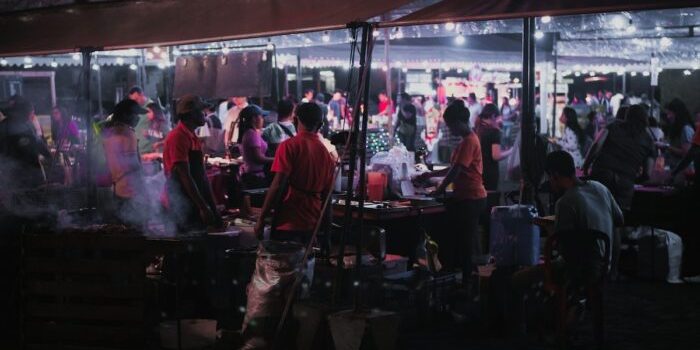Out of Town Blog
Filipino’s Love For Quick Eats
Filipino’s Love For Quick Eats: Exploring the Culinary Culture of the Philippines
The bustling food courts of the Philippines showcase the country’s vibrant culinary culture and Filipinos’ enduring love for quick eats. For the ever-moving workforce and the energetic student population, food courts offer a quick and satisfying solution to their daily hunger pangs. These communal dining spaces, with their diverse array of culinary delights, have become integral to the Filipino lifestyle, providing a convenient and enjoyable way to eat.
Filipino Street Food by Ian Romie Ona via Unsplash
The beauty of food court fare lies in its versatility and affordability. For the busy professional, a visit to the food court is a chance to step away from their desks, even if only for a brief moment, and indulge in a meal that feels like a treat rather than a rushed necessity. Whether it’s a hearty bowl of ramen, a flavorful plate of adobo, or a satisfying serving of siomai rice, these meals deliver the comfort and energy needed to power through the rest of the day. Siomai, with its flavorful meat filling and perfect balance of spices, often served with a side of rice or dipped in soy sauce and calamansi, is a popular choice, reflecting the blend of convenience and taste that food courts offer.
Students, on the other hand, have turned food courts into social hubs. These spaces are more than just places to eat; they are venues for hanging out, studying, and making memories. The affordability of food court offerings makes it possible for students to enjoy good food on a budget. The informal setting of a food court allows for a relaxed atmosphere where friends can gather, share a meal, and enjoy each other’s company without the pressure of a more formal dining environment. For students, the food court experience is as much about the social interaction as it is about the food. The popularity of dishes like siomai rice even inspired a rap song by $ucc titled “Siomai Rice” released in 2010, celebrating this beloved combination and capturing the cultural zeitgeist of the time.
Food courts also reflect the multicultural essence of Filipino cuisine. One can find a variety of dishes from different culinary traditions, all within the convenience of a single location. This diverse array allows people to explore new flavors and cuisines, all while appreciating the comfort of familiar favorites. From Japanese sushi to American burgers, Filipino street food to Korean bibimbap, food courts offer a culinary adventure that suits the adventurous spirit of many Filipinos.
Filipino Street Food by Katlyn Luz via Unsplash
Moreover, the rise of food courts has supported the growth of small businesses and local vendors. Many of these food stalls are family-owned operations, passing down recipes and culinary secrets through generations. By patronizing these stalls, Filipinos are not only indulging in delicious food but also supporting their local economy and preserving culinary traditions.
The love for food court delicacies is also a reflection of the Filipino’s innate sense of community. Eating in a food court is rarely a solitary activity; it’s a shared experience. The communal tables, the bustling atmosphere, and the shared enjoyment of good food create a sense of togetherness. It’s a place where conversations flow easily, laughter is a common backdrop, and the simple act of sharing a meal becomes a way to strengthen bonds.
An interesting evolution in the food court scene is the emergence of unique food combinations that have captured the hearts of many, especially students. Vendors have creatively paired popular items with staple Filipino foods to create hearty and satisfying meals. Siomai rice, for instance, transforms the humble dumpling into a more substantial meal by pairing it with a generous serving of rice. This combination has added variety to the food court menu and provides a hearty option that satisfies even the hungriest of appetites.
Food Court
In essence, the popularity of food court foods among Filipinos is a beautiful confluence of convenience, flavor, affordability, and community. It caters perfectly to the needs of a diverse population, from the hardworking office employee to the carefree student. Food courts are more than just a quick dining option; they are a microcosm of Filipino culture, showcasing the values of resilience, camaraderie, and an unending passion for good food.
So, next time you find yourself in a food court in the Philippines, take a moment to appreciate the rich tapestry of flavors and the lively atmosphere. Whether you’re savoring a bite of siomai, enjoying a plate of adobo, or trying something new, remember that you’re participating in a cherished Filipino tradition – one that celebrates food, community, and the joy of sharing a meal with others.
Like, Follow, and Subscribe to OutofTownBlog.com on Facebook, Twitter, Instagram, and Pinterest, and Team out Of Town on YouTube for more Manila Tourist Spots.
Read:
Experience the Unique Flavors of Dragon Court
Top 10 Eats In Cebu That Won’t Hurt Your Wallet
A Quick Getaway to Apo Island
The Quick Guide to Getting Your Passport in Cebu
Filipino’s Love For Quick Eats
Jayden Allen Mendoza
Out of Town Blog







